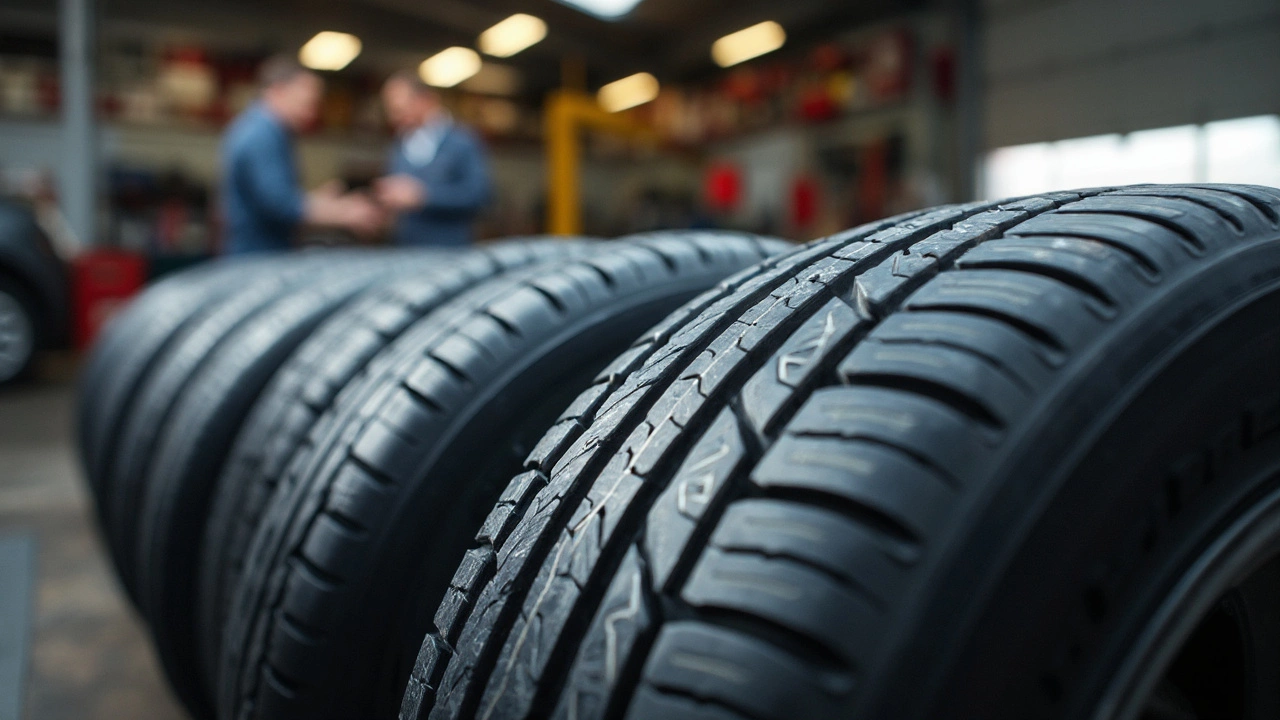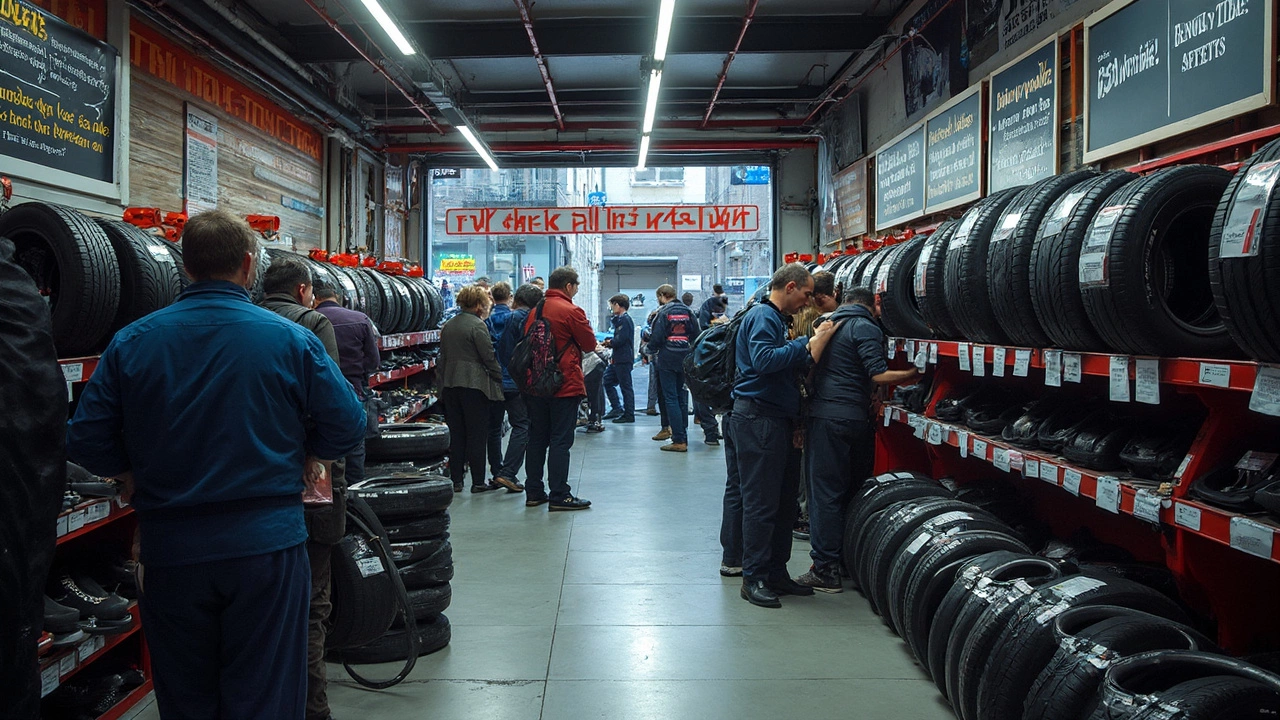So, you're thinking about getting new tires for your car, huh? It's not as straightforward as just picking the cheapest set you can find. There's a lot to consider—after all, these round rubber bits are what keep you connected to the road. First off, tire prices can vary a ton, starting from about 50 bucks each for budget options, and they can shoot up to over 300 dollars for those high-end ones. It all comes down to different factors like tire size, brand, and type.
Need a quick tip? Check your vehicle's manual for the recommended tire specs. That'll save you from buying the wrong size and, potentially, from a heap of future headaches. It's also worth knowing that tires aren't just a one-time purchase; they impact your car's fuel efficiency, ride comfort, and even safety. So it’s smart to think of them as an investment, not just an expense.
Curious about where to get the best deals? Big surprise: online shopping isn't just for gadgets. You can snag some decent deals on tires, often way cheaper than traditional stores. But, remember, you've got to factor in installation fees, which can add a bit to your total price. We'll dive deeper into that, along with how to tell when it's time to replace your tires, in the coming sections.
- Factors Influencing Tire Prices
- Different Tire Types and Costs
- Where to Buy Your Tires
- Tips for Getting the Best Deal
- When to Replace Your Tires
Factors Influencing Tire Prices
Trying to figure out why there's such a big range in car tire prices? It boils down to a few different things. First on the list is the size of the tires. Bigger tires usually mean a bigger bill. Why? Because they need more materials and more complex designs to stay durable on the road. Check out the numbers on the sidewall of your existing tires — they can guide you toward what you need.
The brand also plays a big role in the cost. Popular brands that you've heard of, like Michelin or Goodyear, often come at a premium. Why pay for a brand name? Well, they’ve been in the game a long time and often have a reputation for quality and safety guarantees.
Another factor is the type of tire you’re getting. There are all-season, winter, and performance tires, to name a few. All-season tires are usually the most budget-friendly, whereas winter tires can cost you more because of specialized rubber and tread designs for those icy roads.
Let's not forget about technology and composition. Some high-end tires have cool tech that adapts to road conditions, like Michelin's EverGrip technology that keeps the tire grippy even as it wears down. More features, more cash—simple as that.
Here's a quick look at average prices based on tire types:
| Type of Tire | Average Price (per tire) |
|---|---|
| All-Season | $80 - $150 |
| Winter | $100 - $200 |
| Performance | $150 - $300+ |
Finally, where you're buying the tires from can impact the price. Online retailers often have better deals, but you've got to factor in shipping and installation. On the flip side, local shops offer the advantage of face-to-face service and easier returns if there’s an issue. So, weigh the pros and cons before you swipe that card!
Different Tire Types and Costs
Alright, let’s dive into the world of tires. Not all tires are created equal, and if you're asking about car tires, you're really opening up a can of worms. Here's the lowdown on the most common types you'll come across and what they might cost you.
All-Season Tires: These are the chameleons of the tire world. They're built to handle both summer and winter conditions, making them super convenient. For most people, these are a go-to option, with prices typically ranging from $60 to $150 each, depending on the size and brand.
Performance Tires: If you're craving a better grip and handling, especially on wet roads, performance tires might be your thing. They're made with softer rubber, so they stick to the road better. But heads up, they don't last as long and generally start around $100, climbing up to over $300 per tire.
Winter Tires: These are your car's best friend when snow hits. Really, if you live in a place where winters get icy, winter tires can make driving a lot less nerve-wracking. You can find them for as low as $70, though top-tier brands can ask for $200 or more.
Off-Road Tires: Planning to steer off the beaten path a bit? Off-road tires, or all-terrain tires, will be your ally on rugged terrains. These are tougher and designed to take a beating. Expect the cost to be in the ballpark of $150 to $250 per tire.
Choosing the right tires really boils down to how and where you drive. If you're mostly cruising around town, all-season tires are bang for your buck. But if you're adventurous or face harsh winter roads, investing in specialized tires is worth considering for safety, performance, and peace of mind.
Here's a quick snapshot of the costs:
| Type of Tire | Average Cost Per Tire |
|---|---|
| All-Season | $60 - $150 |
| Performance | $100 - $300 |
| Winter | $70 - $200 |
| Off-Road | $150 - $250 |
Remember, while it's tempting to save on initial costs, a quality set of tires can actually save you money in the long run by improving your car's fuel efficiency and keeping you safe on the road. So don't cut corners here!

Where to Buy Your Tires
You've settled on the type of car tires you want. Now comes the fun part: deciding where to buy them. There's no one-size-fits-all answer here, but there are plenty of options, each with its perks and downsides.
Online retailers are a popular choice these days. Sites like TireRack, DiscountTire, and Amazon offer competitive prices. Plus, they often have helpful customer reviews, which can give you insights into tire performance. The downside? You usually have to handle installation yourself, so factor in the cost of taking your new tires to a local shop for mounting and balancing.
Local tire dealerships might cost a bit more upfront, but they often roll installation and warranties into the price. This could actually save you money in the long run, especially if you run into issues down the road. Plus, having someone to talk to face-to-face can be a huge plus if you're not quite sure what you're looking for.
Another option is buying from a warehouse club like Costco or Sam's Club. They often have pretty sweet deals, particularly if you're a member. Their tire centers usually include perks like free rotations and flat repairs with purchase, which can be a big win.
Oh, and don't forget about your local mechanic. If you've got a shop you trust, it could be worth checking if they can order and install tires for you. Sometimes these shops get deals with distributors that you wouldn’t find browsing online.
To make this less of a headache, here’s a quick checklist when deciding where to buy:
- Price – Compare at least a couple of sources to see who has the best deal.
- Additional costs – Factor in installation and any extra services like alignment.
- Warranty – Check what each retailer offers and how it affects the overall price.
- Convenience – Consider how quickly you need the tires and who can get them to you fastest.
By weighing your options, you can find the best spot to grab those tires and keep your ride rolling smoothly.
Tips for Getting the Best Deal
Getting the best deal on car tires isn’t just about spotting a discount tag. It's about knowing where to look and what to ask for. First things first, timing can be your friend. Many retailers offer end-of-season clearance sales, so keep an eye out for price drops on tire prices during those times.
Shopping online? You could save a bundle. Websites like TireRack and Discount Tire Direct often have sales and, sometimes, rebates. Plus, you can compare different brands and read customer reviews right from your sofa.
- Buy sets instead of singles: Bundling four tires together generally gives you more bang for your buck compared to buying them one at a time.
- Check local shops: Don't count out your local tire shops. They might have deals or be willing to price match online totals.
- Seek out rebates: Brands often offer mail-in rebates and promotions—these could be game-changers for your budget.
- Consider used tires: If you're on a tight budget, checked-out used tires can sometimes be a temporary solution. Just ensure they have decent tread left and no visible damage.
Here's an interesting tidbit: spending just a little more up front on high-quality, durable tires can actually save you money in the long run, thanks to better longevity and fuel efficiency.
Tire cost is negotiable, especially when you buy from a brick-and-mortar store. Don't be shy to ask for a discount or free installation. The worst they can say is no, right?

When to Replace Your Tires
Knowing when to swap out your old car tires is crucial for safety and performance. It's not just about waiting until they're completely bald. There are some tell-tale signs you shouldn’t ignore.
First, check the tread depth. A penny test can give you a quick idea. Insert a penny into the tire's tread groove with Lincoln’s head upside down. If you can see all of Lincoln’s head, it’s time for a replacement. This means your tread depth is less than 2/32 of an inch, which is the legal minimum in many places. But don't wait until the last moment; it's better to replace them a bit earlier for optimal grip and safety.
Look out for any cracks or bulges in the sidewall. These can be danger signs of a potential blowout. If you notice any, don’t wait—get a pro to check them out. Uneven tread wear is another red flag. This might mean your car’s alignment is off, causing your tires to wear down faster on one side.
According to the U.S. National Highway Traffic Safety Administration, it's generally recommended to replace tires every six years, regardless of wear. Most tires will last around ten years max. However, always refer to your tire manufacturer for specific guidelines.
"A car’s tires are like its shoes, impacting both comfort and drive quality,” says James Carter, automotive safety advisor at the National Safety Council.
If you’re planning a long road trip, inspect your tires thoroughly or have them looked over by a professional. Better safe than sorry, right?
Finally, if you notice your vehicle isn't handling as well as it used to—like it's struggling to maintain grip during wet conditions—it’s worth checking if the problem lies in your tires. Stay safe out there!
Remember, keeping an eye on your tires not only contributes to your own safety but also extends the life of your vehicle, and saves you cash in the long run.

